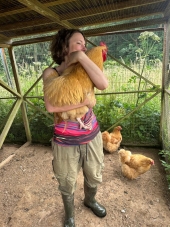








Daniel Kern wrote:...what are some good animals to integrate into a perennial garden and a food forest during the growing season?
My project thread
Agriculture collects solar energy two-dimensionally; but silviculture collects it three dimensionally.




Come join me at www.peacockorchard.com




Welcome to Permies!
A Universal Welcome
Find your way around here
 1
1




 1
1





 1
1




Mountain Krauss wrote:
I think the closest domesticated analog to a deer would be a goat. Since deer are able to feed themselves without damaging the woodland, goats should be able to as well, as long as there aren't too many in a given area.
My project thread
Agriculture collects solar energy two-dimensionally; but silviculture collects it three dimensionally.




Daniel Kern wrote:I like the idea of having a pond in my garden. So maybe I can make ducks work. I have also been considering doing a kind of paddock shift system with lettuce and snails. Snails have a very high feed conversion ratio and I have never tried escargo

I also have been considering raising emus.
My project thread
Agriculture collects solar energy two-dimensionally; but silviculture collects it three dimensionally.
 1
1




Living in Anjou , France,
For the many not for the few
http://www.permies.com/t/80/31583/projects/Permie-Pennies-France#330873




My project thread
Agriculture collects solar energy two-dimensionally; but silviculture collects it three dimensionally.




Xisca - pics! Dry subtropical Mediterranean - My project
However loud I tell it, this is never a truth, only my experience...




Daniel Kern wrote:I like the idea of having a pond in my garden. So maybe I can make ducks work. I have also been considering doing a kind of paddock shift system with lettuce and snails. Snails have a very high feed conversion ratio and I have never tried escargo

I also have been considering raising emus.
Come join me at www.peacockorchard.com








 2
2













Living in Anjou , France,
For the many not for the few
http://www.permies.com/t/80/31583/projects/Permie-Pennies-France#330873
 1
1




Mountain Krauss wrote:I keep reading that goats are disruptive, but I have yet to see it on our farm. It's only 3 goats on 4 acres, but the most disruptive thing they do is just trying to follow me wherever I go. They're very smart animals, and they need a lot of minerals, so I assume most of their destructive ways result from boredom or searching for minerals. If I can keep their environment a wildly variable polyculture, and keep a smorgasbord of prunings available to them, I think we won't have any problems with disruptive behavior. I could be wrong, but it's playing out pretty well so far.
Come join me at www.peacockorchard.com




Daniel Kern wrote:With ducks do you have a place for them to lay or do they lay all over the place? Do they lay as much as chickens?
I would like to grow feed for any ani.also that I raise. Would it be possible to teach ducks to harvest grains?
Come join me at www.peacockorchard.com












Kris schulenburg wrote:Ducks (especially lighter bodied ones) don't "need" water to swim in, they need to get their heads in the water to wash out their nostrils and swallow food.
My project thread
Agriculture collects solar energy two-dimensionally; but silviculture collects it three dimensionally.




Cj Verde wrote:
Kris schulenburg wrote:Ducks (especially lighter bodied ones) don't "need" water to swim in, they need to get their heads in the water to wash out their nostrils and swallow food.
What do they do in the winter when it's too cold for water?
Come join me at www.peacockorchard.com





|
When you have exhausted all possibilities, remember this: you haven't - Edison. Tiny ad:
Looking for cold-climate growers to join a GOOF livestream panel (Missoula)
https://permies.com/t/369111/cold-climate-growers-join-GOOF
|




